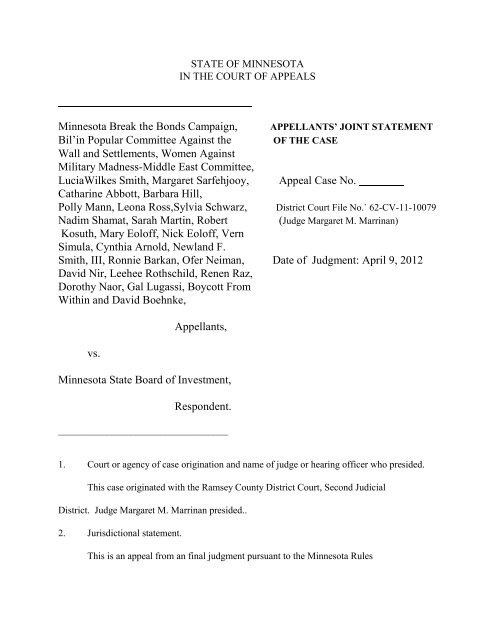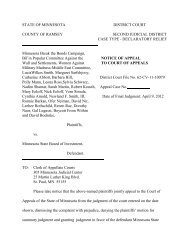Statement of Case - Minnesota Break the Bonds Campaign
Statement of Case - Minnesota Break the Bonds Campaign
Statement of Case - Minnesota Break the Bonds Campaign
You also want an ePaper? Increase the reach of your titles
YUMPU automatically turns print PDFs into web optimized ePapers that Google loves.
STATE OF MINNESOTAIN THE COURT OF APPEALS<strong>Minnesota</strong> <strong>Break</strong> <strong>the</strong> <strong>Bonds</strong> <strong>Campaign</strong>, APPELLANTS’ JOINT STATEMENTBil’in Popular Committee Against <strong>the</strong> OF THE CASEWall and Settlements, Women AgainstMilitary Madness-Middle East Committee,LuciaWilkes Smith, Margaret Sarfehjooy, Appeal <strong>Case</strong> No.Catharine Abbott, Barbara Hill,Polly Mann, Leona Ross,Sylvia Schwarz, District Court File No.` 62-CV-11-10079Nadim Shamat, Sarah Martin, Robert (Judge Margaret M. Marrinan)Kosuth, Mary Eol<strong>of</strong>f, Nick Eol<strong>of</strong>f, VernSimula, Cynthia Arnold, Newland F.Smith, III, Ronnie Barkan, Ofer Neiman, Date <strong>of</strong> Judgment: April 9, 2012David Nir, Leehee Rothschild, Renen Raz,Dorothy Naor, Gal Lugassi, Boycott FromWithin and David Boehnke,vs.Appellants,<strong>Minnesota</strong> State Board <strong>of</strong> Investment,Respondent.___________________________________1. Court or agency <strong>of</strong> case origination and name <strong>of</strong> judge or hearing <strong>of</strong>ficer who presided.This case originated with <strong>the</strong> Ramsey County District Court, Second JudicialDistrict. Judge Margaret M. Marrinan presided..2. Jurisdictional statement.This is an appeal from an final judgment pursuant to <strong>the</strong> <strong>Minnesota</strong> Rules
<strong>of</strong> Appellate Procedure 103.03(a). The judgment disposed <strong>of</strong> all claims by and against all parties.The time for appeal is 60 days from entry <strong>of</strong> judgment. Minn.R.App.P. 104.01, Subd. 1.Judgment was entered on April 9, 2012.3. State type <strong>of</strong> litigation and designate any statutes at issue.This was a civil lawsuit brought jointly by <strong>the</strong> appellants for declaratory judgment andrelated affirmative relief. The lawsuit sought a declaration from <strong>the</strong> court that <strong>the</strong> Respondent,<strong>the</strong> <strong>Minnesota</strong> State Board <strong>of</strong> Investment (SBI), by investing in Israel <strong>Bonds</strong>, 1) exceeded itsinvestment authority, 2) violated its statutory duty to invest plan assets lawfully, and 3) violated<strong>the</strong> prudent person standard. The lawsuit sought a final judgment directing <strong>the</strong> SBI to divest fromall Israel <strong>Bonds</strong>. The statutes at issue include Minn. Stat. §§ 11A.24 and 356A.4. Brief description <strong>of</strong> claims, defenses, issues litigated and result below.The appellants are a diverse group <strong>of</strong> <strong>Minnesota</strong>ns, Israelis, Palestinians, Christians,Jews, <strong>Minnesota</strong> state pension fund beneficiaries, educators and community organizers andorganizations who share <strong>the</strong> common purpose <strong>of</strong> promoting equality, justice and human rights for<strong>the</strong> indigenous Palestinian population in both <strong>the</strong> State <strong>of</strong> Israel and <strong>the</strong> occupied Palestinianterritories. Respondent <strong>Minnesota</strong> State Board <strong>of</strong> Investment has invested millions <strong>of</strong> <strong>Minnesota</strong>state retirement fund dollars in Israel <strong>Bonds</strong>. Israel <strong>Bonds</strong> are government obligations issued by<strong>the</strong> State <strong>of</strong> Israel. A portion <strong>of</strong> <strong>the</strong> money Israel obtains from <strong>the</strong> sale <strong>of</strong> Israel <strong>Bonds</strong> materiallysupports settlement activities in <strong>the</strong> occupied Palestinian territories that violate international law.Appellant’s filed <strong>the</strong>ir Complaint on December 12, 2011 after nearly a year <strong>of</strong>2
unsuccessfully attempting to convince <strong>the</strong> respondent to divest from its portfolio <strong>of</strong> Israel <strong>Bonds</strong>on both legal and moral grounds. The complaint alleges three bases (“Counts”) for relief.Count I <strong>of</strong> <strong>the</strong> Complaint alleges that <strong>the</strong> SBI has exceeded its statutory investmentauthority and invested state retirement funds unlawfully by investing in Israel <strong>Bonds</strong>. Thecategories <strong>of</strong> asset classes in which <strong>the</strong> SBI is permitted to invest state retirement funds is setforth in Minn. Stat. § 11A.24, Subdivisions 1-6. Subdivision 2 <strong>of</strong> Minn. Stat. § 11A.24 controls<strong>the</strong> types <strong>of</strong> investments in government obligations that <strong>the</strong> SBI is permitted to make. It does notauthorize <strong>the</strong> SBI to invest in Israel <strong>Bonds</strong>.Count II <strong>of</strong> <strong>the</strong> Complaint alleges that <strong>the</strong> SBI has violated its fiduciary obligationspursuant to Minn. Stat. §§ 356A to invest plan assets in a manner consistent with law. TheComplaint alleges that Article 49 <strong>of</strong> <strong>the</strong> Fourth Geneva Convention, which prohibits anoccupying power from transferring parts <strong>of</strong> its own civilian population into <strong>the</strong> territory itoccupies, is <strong>the</strong> “law <strong>of</strong> <strong>the</strong> land” in <strong>the</strong> United States and binding on <strong>the</strong> State <strong>of</strong> <strong>Minnesota</strong>because it has been ratified pursuant to Clause 2 <strong>of</strong> Article VI <strong>of</strong> <strong>the</strong> Constitution. Accordingly,<strong>the</strong> Complaint alleges that <strong>the</strong> SBI is not investing plan assets in a manner consistent with law byaiding and abetting <strong>the</strong> State <strong>of</strong> Israel’s violation <strong>of</strong> Article 49 by investing in Israel <strong>Bonds</strong> withknowledge that <strong>the</strong> invested state retirement funds will, in part, be used by Israel for its illegalsettlement activities.Count III <strong>of</strong> <strong>the</strong> Complaint alleges that <strong>the</strong> SBI has violated <strong>the</strong> prudent person standardthat it is required to exercise pursuant to Minn. Stat. § 356A in making its investment decisionsby investing in Israel <strong>Bonds</strong>. The complaint alleges that <strong>the</strong> SBI is not only entangling publicemployee pension funds and SBI <strong>of</strong>ficials in Israel’s violations <strong>of</strong> customary international law,3
ut is also exposing <strong>the</strong> pension plan, <strong>the</strong> SBI, its agents, <strong>of</strong>ficers and directors and ultimately <strong>the</strong>taxpayers <strong>of</strong> <strong>Minnesota</strong> to liability and <strong>the</strong> costs <strong>of</strong> defending against potential claims that couldbe brought on <strong>the</strong> basis that <strong>the</strong> SBI has aided and abetted or o<strong>the</strong>rwise provided unrestrictedfinancial material support to an international law violator that has in fact used funds obtained inpart from <strong>the</strong> sale <strong>of</strong> Israel <strong>Bonds</strong> to commit international law violations.The SBI moved to dismiss <strong>the</strong> complaint. It argued that 1) <strong>the</strong> appellants lacked standing,2) <strong>the</strong> language <strong>of</strong> Minn. Stat. § 11A.24 allows <strong>the</strong> SBI to purchase Israel <strong>Bonds</strong> because <strong>the</strong>y areincluded in <strong>the</strong> general category <strong>of</strong> “international securities” in Minn. Stat. § 11A.24, Subd.. 6(a)(5), and 3) under federal case law (that addresses <strong>the</strong> jurisdiction <strong>of</strong> Article III federal courts),<strong>the</strong>re is no justiciable controversy based on <strong>the</strong> political question and act <strong>of</strong> state doctrines.Finally, <strong>the</strong> SBI argued that Counts II and III should be dismissed because “mere investment” isinsufficient to prove aiding and abetting liability.The appellants opposed <strong>the</strong> motion for dismissal while also moving for summaryjudgment as to Count I, arguing that <strong>the</strong> unambiguous provisions <strong>of</strong> Minn. Stat. § 11A.24 do notpermit <strong>the</strong> SBI to purchase Israel <strong>Bonds</strong> and, if <strong>the</strong> provisions <strong>of</strong> <strong>the</strong> statute were ambiguous, thatvarious principles <strong>of</strong> statutory construction would prevent any interpretation permitting <strong>the</strong> SBIto invest in Israel <strong>Bonds</strong>.As to <strong>the</strong> issue <strong>of</strong> standing, <strong>the</strong> appellants argued that under <strong>Minnesota</strong> law <strong>the</strong> <strong>Minnesota</strong>resident appellants had taxpayer standing to bring an action challenging <strong>the</strong> unlawfuldisbursements <strong>of</strong> public money or illegal action on <strong>the</strong> part <strong>of</strong> public employees, that thoseappellants who were public pension plan beneficiaries had standing to challenge <strong>the</strong> SBI’sexercise <strong>of</strong> its fiduciary responsibilities, that <strong>the</strong> organizational appellants had associational4
standing based on <strong>the</strong> standing <strong>of</strong> <strong>the</strong>ir members, and that <strong>the</strong> non-<strong>Minnesota</strong> individualappellants had alleged sufficient “injury-in-fact”, had extraordinary personal interests in <strong>the</strong> caseor had associational standing based on <strong>the</strong> standing <strong>of</strong> at least one o<strong>the</strong>r co-appellant.As to justiciability, <strong>the</strong> appellants relied on state precedent to argue that <strong>the</strong> lawfulness <strong>of</strong><strong>the</strong> SBI’s fiscal decisions are subject to court review and do not constitute “political questions.”The appellants fur<strong>the</strong>r argued that <strong>the</strong> <strong>Minnesota</strong> Supreme Court has long held that it not onlyhas <strong>the</strong> power but <strong>the</strong> duty to enforce treaties. Thus, if <strong>the</strong> United States has ratified <strong>the</strong> FourthGeneva Convention and <strong>the</strong> SBI is guilty <strong>of</strong> violating it under <strong>the</strong> law <strong>of</strong> accomplice liability,<strong>Minnesota</strong>’s courts are obligated to put a stop to <strong>the</strong> violation and to fur<strong>the</strong>r declare that <strong>the</strong> SBIhas violated its fiduciary duty to invest prudently. Referencing federal case law, <strong>the</strong> appellantsargued that <strong>the</strong> court is not called upon to judge <strong>the</strong> conduct <strong>of</strong> foreign relations by <strong>the</strong> UnitedStates government, but ra<strong>the</strong>r <strong>the</strong> conduct <strong>of</strong> a state agency and that <strong>the</strong>re is no executive orlegislative branch policy choice or value determination involved in <strong>the</strong> question <strong>of</strong> whe<strong>the</strong>r <strong>the</strong>SBI has aided and abetted a violation <strong>of</strong> <strong>the</strong> Fourth Geneva Convention. Additionally, <strong>the</strong>appellants argued that <strong>the</strong> prohibition against war crimes mandated under <strong>the</strong> Fourth GenevaConvention are jus cogens violations which are exempt from <strong>the</strong> “act <strong>of</strong> state” doctrine.Finally, <strong>the</strong> appellants argued that under existing aiding and abetting standards, <strong>the</strong>complaint more than adequately pleads facts showing that <strong>the</strong> SBI was not “merely a purchaser<strong>of</strong> bonds”, but acted knowingly in providing substantial assistance to Israel’s illegal activitiessufficient to satisfy <strong>the</strong> requirements <strong>of</strong> <strong>the</strong> Restatement (Second) <strong>of</strong> Torts, § 876(b), <strong>the</strong>prevailing civil standard in <strong>Minnesota</strong> for imposing vicarious liability, which is also among <strong>the</strong>“well settled <strong>the</strong>ories <strong>of</strong> vicarious liability under federal common law.”5
On April 9, 2012, <strong>the</strong> District Court judge adopted all <strong>of</strong> <strong>the</strong> SBI’s arguments, and indeedissued an order that was virtually identical to <strong>the</strong> proposed Findings <strong>of</strong> Fact, Conclusions <strong>of</strong> Lawand Order for Judgment drafted by SBI, dismissing Appellants’ Complaint and denyingAppellants’ motion for summary judgment.5. Issues proposed to be raised on appeal.A. Whe<strong>the</strong>r <strong>the</strong> appellants have standing to bring <strong>the</strong> claims alleged in <strong>the</strong>complaint when <strong>the</strong>y include pension beneficiaries who have a direct stake in <strong>the</strong> SBI’sinvestments, <strong>Minnesota</strong> taxpayers, and o<strong>the</strong>rs who are injured by <strong>the</strong> SBI’s actions ?B. Whe<strong>the</strong>r <strong>the</strong> SBI is permitted under <strong>Minnesota</strong> law to invest state pension andretirement funds in Israel <strong>Bonds</strong> where <strong>the</strong> plain language <strong>of</strong> <strong>the</strong> applicable statute permitsinvestment in narrow categories <strong>of</strong> foreign bonds, and does not include Israel <strong>Bonds</strong>?C. Whe<strong>the</strong>r <strong>the</strong> political question and act <strong>of</strong> state doctrines prevent <strong>the</strong> court fromadjudicating Counts II and III <strong>of</strong> <strong>the</strong> complaint?D. Whe<strong>the</strong>r Counts II and III <strong>of</strong> <strong>the</strong> complaint state claims upon which relief can begranted?6. Related appeals.None.7. Contents <strong>of</strong> Record.Is a transcript required? No. (A transcript <strong>of</strong> <strong>the</strong> argument on <strong>the</strong> parties’ cross-motions6
has already been prepared and made part <strong>of</strong> <strong>the</strong> record, although it is not essential to <strong>the</strong> appeal.There was no evidentiary hearing.)8. Is oral argument requested? Yes9. Identify <strong>the</strong> type <strong>of</strong> brief to be filed.Formal Brief under Rule 128.02.10. Names, addresses, zip codes and telephone numbers <strong>of</strong> attorney for appellant andrespondent.Attorneys for Appellants:Jordan S. Kushner431 South 7th Street, Suite 2446Minneapolis, <strong>Minnesota</strong> 55415(612) 288-0545Bruce D. Nestor3547 Cedar Avenue SouthMinneapolis, MN 55407(612) 659-9019Peter J. Nickitasth431 S. 7 St., Suite 2446P.O. Box 15221Minneapolis, MN 55415-0221(651) 238-34457
Attorneys for Respondent:Kristyn AndersonAssistant <strong>Minnesota</strong> attorney General445 <strong>Minnesota</strong> Street, Suite 900St. Paul, MN 55101(651) 757-1225DATED: ByJordan S. Kushner, ID 219307Attorney for Appellant431 South 7th Street, Suite 2446Minneapolis, MN 55415(612) 288-0545Bruce D. Nestor, 318024 – MN3547 Cedar Avenue SouthMinneapolis, MN 55407(612) 659-9019(612) 436-3664 – Facsimilenestor@denestlaw.comPeter J. Nickitas, 212313-MNth431 S. 7 St., Suite 2446P.O. Box 15221Minneapolis, MN 55415-0221651.238.3445/FAX 1.888.389.7890peterjnickitaslawllc@gmail.com,peterjnickitas@me.comATTORNEYS FOR PLAINTIFFS/APPELLANTS8



